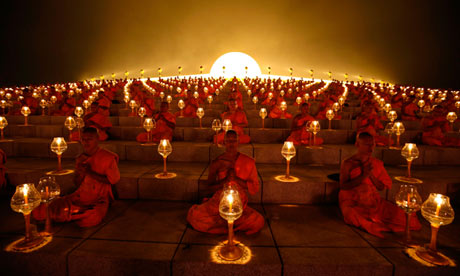I don't think it is William Roache's fault (nor Glenn Hoddle!) that he misunderstands Karma. Karma IS complex. i am still struggling with it myself. For example, i have watched some BBC documentaries on reincarnation where a boy in his previous life was a soldier and therefore killed people at war. Logically, he should be stewing in a pot somewhere in hell.. but instead, he is happily running around in Glasgow! So how does that work. We are taught in Buddhism that if we do various evil actions, we will boil in hell for aeons and aeons (translated, lock the door and throw away the key).
I do understand that certain karma ripens when there are conducive conditions (which is what is alluded in the article below). So i guess that the karma for those who have reincarnated back into a precious human life seems to have been okay enough for them to have successfully navigated the karmic seas as a blind turtle. How much the Lamrim is metaphor and how much it is reality, I really don't know. Would anyone like to share what they think?
William Roache misunderstands karma – it is not simple cause and effectThe Coronation Street star joins a long list of celebrities who have misinterpreted Buddhist and Hindu philosophy
Mary Finnigan - guardian.co.uk, Monday 25 March 2013 08.59 GMT
 Thai Buddhist monks celebrate Makha Bucha day. The 'Buddhist view of karma … is rooted in the mind rather than in external circumstances.' Photograph: Rungroj Yongrit/EPA
Thai Buddhist monks celebrate Makha Bucha day. The 'Buddhist view of karma … is rooted in the mind rather than in external circumstances.' Photograph: Rungroj Yongrit/EPAThe Coronation Street actor William Roache has apologised for offence he caused with remarks about sex abuse during a TV interview. Roache's comments suggested that victims brought abuse upon themselves because of their actions "in previous lives". Not only did he upset a lot of people, but according to Buddhist and Hindu traditions he also missed the point about how karma works.
Roache joins a list of celebrities making simplistic statements about karma. In 1999 a furore erupted around the England football manager Glenn Hoddle, when he said in an interview that disabled people were being punished for sins in previous lives. He was sacked soon afterwards.
In 2011 the singer George Michael did a mea culpa on BBC Radio 2 about being caught twice driving under the influence of cannabis: "This was a hugely shameful thing to have done repeatedly, so karmically I felt like I had a bill to pay. I went to prison. I paid my bill."
Their comments highlight the fact that for most people, not much has changed since the 1960s – when young western travellers returned home from India and when the Beatles fell in love with the Maharishi – despite the growth in the number of Buddhist and Hindu institutions across the western world.
Enchanted by the mystique of oriental religion, thousands of people rejected Christianity and declared themselves as Buddhist or Hindu. But many of them did this more from the heart than the head and also because it was fashionable. There was very little study involved, so understanding of Buddhist doctrine in particular tended to be naive and over-simplified.
As time passed theories cherry-picked by hippie travellers from oriental sources were mixed in with a variety of other influences – such as shamanism, Celtic mythology, crystal healing, psychotherapy – to become a kind of esoteric goulash known as new age. It is more like a middle age now, but is still a thriving multinational movement.
Ask an expert why the concept or karma, linked with reincarnation and fascination with past lives, has penetrated western popular imagination above and beyond all other aspects of eastern philosophy, and the answer will probably be along the lines that human beings are terrified of what lies beyond the doorway of death, so we cling to continuity in one form or another – described in some religious contexts as eternal life, in others as reincarnation.
But this, according to the British Tibetan Buddhist teacher Lama Jampa Thaye, denies the complexity of the Buddhist view of karma, which is rooted in the mind rather than in external circumstances. "We cannot simply isolate one particular action in the past and say it alone is the cause of a specific result nor, that if we are good in one life, we somehow deserve only happiness in the next," he says.
Interpretations of karma as direct cause and effect are incorrect, he adds, because we simply do not know how it works. "In the Buddhist tradition only a fully realised being like the historical Buddha could say anything specific about karmic consequences."
The Buddhist focus on attitude, and the conduct that flows from it, is said to be the basis of not only our own lives, but also the entire physical world. Karmic cycles are sometimes compared with seeds as a primary cause because they are capable of reproducing the species of plant from which they came. But just as seeds need secondary causes such as light, moisture and air in order to mature, so too do primary karmic causes which remain as the traces of past actions in each individual stream of consciousness.
Misconceptions around karma and reincarnation are not likely to disappear soon and will almost certainly be in the media spotlight when the Dalai Lama dies. He is the 14th reincarnation and is keeping his options open. He has said he might be the last, but has also hinted that he might be reborn outside Tibet.